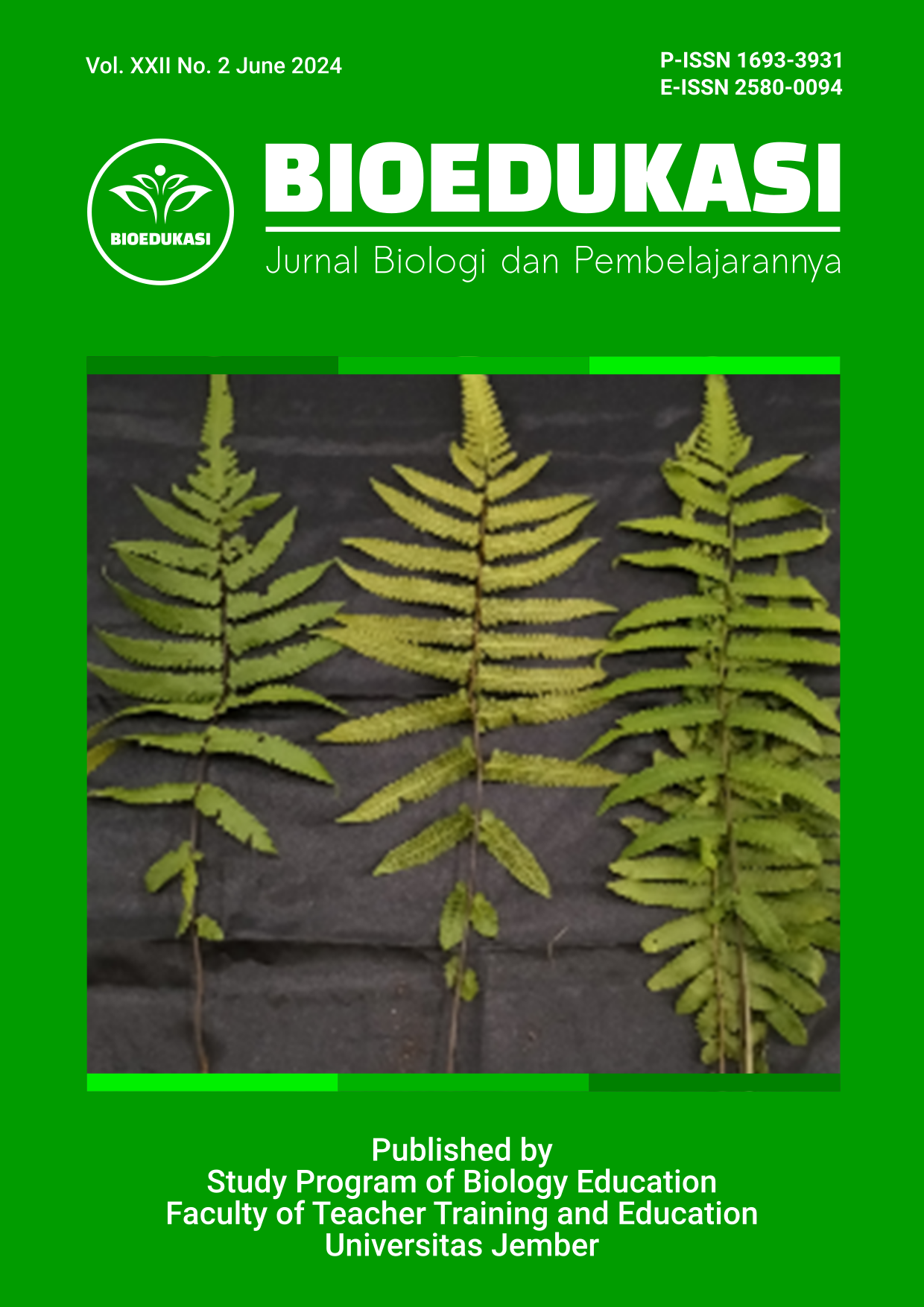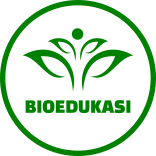Kuartet Biologi Digital Application to Build Digital Literacy and Cognitive Learning Outcomes of Students in High School
DOI:
https://doi.org/10.19184/bioedu.v22i2.44389Keywords:
Biology, Cognitive Learning Outcomes, Digital Literacy, Education, Kuartet Biologi ApplicationAbstract
Digital literacy is understood as a person's way of thinking, attitude and skills in using electronic and digital devices appropriately to help with work. One of the efforts to integrate digital technology into learning is by using learning applications, namely the Kuartet Biologi application. This research focuses on building students' digital literacy and cognitive learning outcomes through the Kuartet Biologi application. This study involved 58 students of class XI IPA SMAS Elim Makassar, South Sulawesi using a pre-test-post-test design with a non-equivalent control group. The pretest score as a covariant to analyse students' cognitive learning outcomes. Digital literacy was done by observation from the observer as many as 15 statements. Digital literacy was analysed using ANOVA test. Cognitive learning outcomes were analysed using ANCOVA test. The results showed the effect of digital literacy is 0.00 < 0.05 and cognitive learning outcomes of students who used the Biology Quartet application with classes did not use it is 0.00 < 0.05. The Kuartet Biologi application is proven to be more effective in building digital literacy and cognitive learning outcomes of students to build cognitive, technical, social-emotional, and behavioural dimensions in using electronic devices while learning and helping students have better knowledge.
Downloads
References
Aripin, Ipin. (2018). Konsep dan Aplikasi Mobile Learning dalam Pembelajaran Biologi. Jurnal Bio Educatio, 3(1), 2018, 1-9. 2541-2280.
Boyle, E. A., Hainey, T., Connolly, T. M., Gray, G., Earp, J., Ott, M., Lim, T., Ninaus, M., Ribeiro, C., & Pereira, J. (2016). An update to the systematic literature review of empirical evidence of the impacts and outcomes of computer games and serious games. Computers & Education, 94, 178–192. https://doi.org/10.1016/j.compedu.2015.11.003
Braghirolli, L. F., Ribeiro, J. L. D., Weise, A. D., & Pizzolato, M. (2016). Benefits of educational games as an introductory activity in industrial engineering education. Computers in Human Behavior, 58, 315–324.
Crisp, G. (2011). Teacher’s handbook on e-Assessment. Transforming Assessment-An ALTC Fellowship Activity, 1-18.
Dinata, Yogi Nurcahyo. (2013). Penggunaan Media Pembelajaran Video Tutorial untuk Meningkatkan Hasil Belajar Siswa Teknik Gambar Bangunan SMK N 1 Seyegan pada Mata Pelajaran Menggambar dengan Autocad. Skripsi. Yogyakarta: UNY
Drigas, A. S., & Pappas, M. A. (2015). A review of mobile learning applications for mathematics. iJIM, 3(3), 18-23. http://dx.doi.org/10.3991/ijim.v9i3.4420.
Durall, E., Virnes, M., Leinonen, T., & Gros, B. (2020). Ownership of learning in monitoring technology. Interaction Design and Architecture(s), 45, 133–154. https://doi.org/10.55612/s-5002-045-006
Durán, L., Almeida, A. M., & Figueiredo-Braga, M. (2021). Digital audiovisual contents for literacy in depression: a pilot study with university students. Procedia Computer Science, 181, 239–246. https://doi.org/10.1016/j.procs.2021.01.140
Dommett, E. J. (2018). Learner ownership of technology-enhanced learning. Interactive Technology and Smart Education, 15(1), 79–86. doi:10.1108/itse-08-2017-0042. 10.1108/ITSE-08-20.
Fiteriani, I. & Baharudin, B. (2017). Analisis Perbedaan Hasil Belajar Kognitif Menggunakan Metode Pembelajran Kooperatif yang Berkombinasikan pada Materi IPA di MIN Bandar Lampung. TERAMPIL Jurnal Pendidikan dan Pembelajaran Dasar, 4(2), 1-30
Hwang, G.-J., Wu, P.-H., & Chen, C.-C. (2012). An online game approach for improving students’ learning performance in web-based problem-solving activities. Computers & Education, 59(4), 1246–1256. https://doi.org/10.1016/j.compe du.2012.05.009.
Jayawardana, H. B. A. (2017). PARADIGMA PEMBELAJARAN BIOLOGI DI ERA DIGITAL. JURNAL BIOEDUKATIKA, 5(1), 12. https://doi.org/10.26555/bioedukatika.v5i1.5628
Jelatu, S., Kurniawan, Y., Kurnila, V. S., Mandur, K., & Jundu, R. (2019). Collaboration TPS Learning Model and m-Learning Based on Android for Understanding of Trigonometry Concepts with Different Cognitive Style. International Journal of Instruction, 12(4), 545-560. https://doi.org/10.29333/iji.2019.12435a
Jeno, Lucas Matias & Grytnes, John Arvid & Vandvik, Vigdis. (2017). The effect of a mobile-application tool on biology students' motivation and achievement in species identification: A Self-Determination Theory perspective. Computers & Education. 107. 1-12. 10.1016/j.compedu.2016.12.011.
Jones, R. H., & Hafner, C. A. (2012). Understanding digital literacies. London and New York: Routledge.
Klimova, B. (2019). Impact of Mobile Learning on Students’ Achievement Results. Education Sciences, 9(2), 90. https://doi.org/10.3390/educsci9020090
Knobel, M., & Lankshear, C. (2006). Digital Literacy and Digital Literacies: Policy, Pedagogy and Research Considerations for Education. Nordic Journal of Digital Literacy, 1(1), 12–24. https://doi.org/10.18261/ISSN1891-943X-2006-01-03
Lankshear, Colin., & Knobel, Michele. (2015). Digital Literacy and Digital Literacies: Policy, Pedagogy and Research Considerations for Education. Nordic Journal of Digital Literacy, no. 4 : 8–20. https://doi.org/10.18261/issn1891-943x-2015-jubileumsnummer-02.
Liu, C.-C., Cheng, Y.-B., & Huang, C.-W. (2011). The effect of simulation games on the learning of computational problem solving. Computers & Education, 57(3), 1907–1918. https://doi.org/10.1016/j.compe du.2011.04.002
Lubbe, J. C. (Irene). (2016). Digital fluency of faculty members at an ODL institution. Progressio, 38(2), 63–83. https://doi.org/10.25159/02568853/1505
Martin, A. (2006). A european framework for digital literacy. Nordic Journal of Digital Literacy, 1(2), 151–161. https://doi.org/10.18261/ISSN1891-943X-2006-02-06
Mavroudi, A., Almeida, T., Frennert, S., Laaksolahti, J., & Viberg, O. (2022). A card game for designing activities for technology-enhanced learning in higher education. Education and Information Technologies, 27(2), 2367–2383. https://doi.org/10.1007/s10639-021-10668-z
Muhaemin, B. (2017). Kebijakan pengembangan pendidikan: Pra kemerdekaan era reformasi dalam konteks perubahan sosial. Jurnal Studi Pendidikan Vol XV | No.1 Januari – Juni 2017.
Moehani, Dwi Kirana. 2018. “The Impact Of The Use Of Materials-Based Multicultural Media With The Quartet Card Towards The Attitude Of Student.†212: 61–67. DOI:10.2991/icei-18.2018.14
Ng, W. (2012). Can we teach digital natives digital literacy? Computers & Education, 59(3), 1065–1078. https://doi.org/10.1016/j.compedu.2012.04.016
Philpot, T. A., Hall, R. H., Hubing, N., & Flori, R. E. (2005). Using games to teach statics calculation procedures: Application and assessment. Computer Applications in Engineering Education, 13(3), 222–232. https://doi.org/10.1002/cae.20043
Rezaei, A., Mai, N., & Pesaranghader, A. (2014). The Effect of Mobile Applications on English Vocabulary Acquisition. Jurnal Teknologi, 68(2). https://doi.org/10.11113/jt.v68.2912
Sadikin, A., & Hakim, N. (2019). Pengembangan Media E-Learning Interaktif Dalam Menyongsong Revolusi Industri 4.0 Pada Materi Ekosistem Untuk Siswa SMA: Interactive Media Development of E-Learning in Welcoming 4.0 Industrial Revolution on Ecosystem Material for High School Students. BIODIK, 5(2), 131–138. https://doi.org/10.22437/bio.v5i2.7590
Sánchez, J., & Olivares, R. (2011). Problem solving and collaboration using mobile serious games. Computers & Education, 57(3), 1943–1952. https://doi.org/10.1016/j.compe du.2011.04.012.
Setiyorini, I., & Abdullah, M. H. (2013). Penggunaan Media Permainan Kartu Kuartet Pada Mata Pelajaran IPS Untuk Peningkatan Hasil Belajar Siswa di Sekolah Dasar. Jurnal Penelitian Pendidikan Guru Sekolah Dasar, 1 (2), 1–10.
Šćepanović, S., VujiÄić, T., Matijević, T., & Radunović, P. (2015). GAME BASED MOBILE LEARNING – APPLICATION DEVELOPMENT AND EVALUATION. The Sixth International Conference on e-Learning 24-25 September 2015, Belgrade, Serbia
Scott, C. L. (2015). The Futures of learning 1: Why Must Learning Content and Methods Change in The 21st Century. Paris: UNESCO: Education Research and Foresight.
Topalli, D., & Cagiltay, N. E. (2018). Improving programming skills in engineering education through problem-based game projects with Scratch. Computers & Education, 120, 64–74. https://doi.org/10.1016/j.compedu.2018.01.011.
Wahyudi, T. (2021). Penguatan Literasi Digital Generasi Muda Muslim Dalam Kerangka Konsep Ulul Albab. Al-Mutharahah: Jurnal Penelitian Dan Kajian Sosial Keagamaan, 18 (2), 161-178. DOI: 10.46781/al-mutharahah.v18i2.368
Wang, Q., & Abbas, M. (2018). Designing web-games for transportation engineering education. Computer Applications in Engineering Education, 26(5), 1699–1710. https ://doi.org/10.1002/CAE.22031






